June 2023 marked the 25th Anniversary of Gramercy! Thank you to our valued investors, trusted business partners and team members without whom this milestone could not have been reached. We are excited for the opportunities we see ahead, and look forward to continuing to deliver upon our mission to have a positive impact on the well-being of our clients, portfolio investments (and their communities) and our team members.
Contents
Market Overview
Macro Review
Fed officials pushed back on interest rate cuts. The Fed’s Vice Chair noted risks around easing too much on improving inflation, adding that the disinflationary path would be bumpy. Even the Fed’s Waller, who started the rally last November with dovish comments, said a few more months of inflation data would be needed to evaluate trends. The suggestion was that the Fed delaying rate cuts by a few months would not have a substantial effect on the economy, which was supported by Harker saying “give us a couple of meetings”. This was captured by the FOMC minutes with the statement that “several participants mentioned the risk that financial conditions were or could become less restrictive than appropriate”. Unsurprisingly, the market shifted to the first cut beginning in June, rather than May, as March is very much expected to be another pause. Elsewhere, the focus was on equities, specifically, Nvidia. Nvidia’s stock rallied some 16% after earnings and surpassed Meta’s market capitalization. Equities posted fresh all-time highs for Japan and Germany. Less emphasis was placed on U.S. PMIs which modestly declined to 51.4 from 52 previously. Earlier in the week, the PBoC cut the 5-year Loan Prime Rate by 25bps to 3.95%. Pakistan’s electoral runners-up have sought to form a coalition, which is a movement away from a populist alternative. Other EM events covered the first Central Bank meeting for Turkey’s new Governor as interest rates were held unchanged, South Africa confirmed that national elections will take place on May 29 after its annual budget, and the Senegalese President will no longer run in the next election.
EM Credit Update
Emerging markets sovereign credit (cash bonds) ended the week up 0.2% with credit spreads 7bps tighter. Sovereign outperformers were Venezuela, Sri Lanka and Zambia, while Ethiopia, Ghana and Croatia underperformed. As the largest constituent of the EM corporate indices, First Quantum, issued a $1.6bn senior secured second lien note, after FY23 results when they had announced a $500m prepayment facility, $1bn equity raise, bank debt extension to 2027, revised covenants and are considering a handful of large asset sales, despite the ongoing saga in Panama where management announced that the ICSID arbitration claim was $20bn over Cobre Panama. With some irony, First Quantum issued debt on the same day that the Panama sovereign issued $3.1bn in sovereign bonds.
The Week Ahead
Next week will see some focus on U.S. inflation. After three months of low m/m prints, PCE inflation is likely to have accelerated in January, after a jump in services CPI and core PPI items. It will also act as a key indicator for market views around Fed rate cut timing and is therefore a “live” risk event for U.S. Treasuries. The Reserve Bank of New Zealand is likely to hold rates, while the National Bank of Hungary is likely cut by 100bps. China’s will also publish its latest NBS and Caixin manufacturing PMIs, albeit later in the week. India will furnish 4Q GDP growth data, which is expected to soften, as is Turkish GDP from a high 3Q figure (5.9%). We can also expect a lively Central Bank of Nigeria meeting after a series of frenetic headlines and outsized volatility in the naira. The sell-side is calling for a 200bps hike in Nigeria to temper the FX weakness.
Highlights from emerging markets discussed below: Venezuela to re-enter JPMorgan’s flagship sovereign benchmarks; Turkey’s Central Bank (CBT) remains hawkish in first policy meeting under new Governor; and South Africa budget received positively by market.
Fixed Income
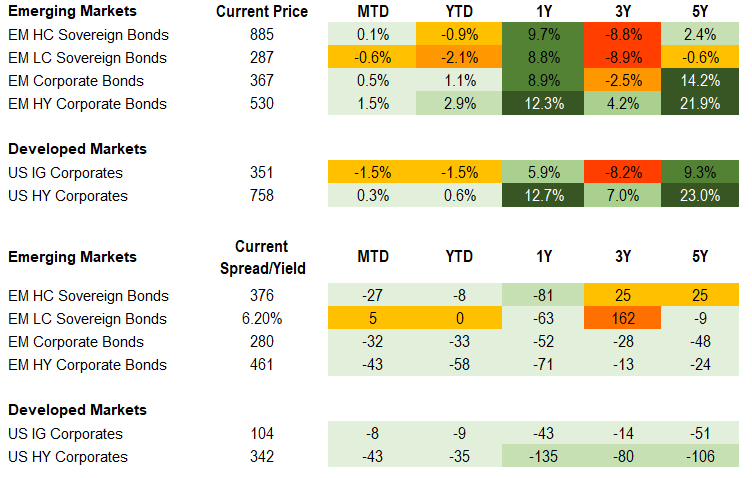
Equities
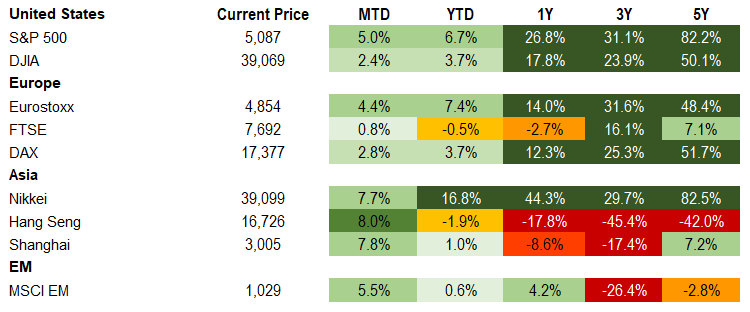
Commodities

Source for data tables: Bloomberg, JPMorgan, Gramercy. EM Fixed Income is represented by the following JPMorgan Indicies: EMBI Global, GBI-EM Global Diversified, CEMBI Broad Diversified and CEMBI Broad High Yield. DM Fixed Income is represented by the JPMorgan JULI Total Return Index and Domestic High Yield Index. Fixed Income, Equity and Commodity data is as of February 23, 2024 (mid-afternoon).
Emerging Markets Weekly Highlights
Venezuela to re-enter JPMorgan’s flagship sovereign benchmarks
Event: This week, JP Morgan concluded its “Index Watch observation” on Venezuela, which was initiated in November 2023 and extended into February. It was decided that sovereign (VENZ) and PDVSA bonds will be allowed to re-enter the EMBI Global/Diversified benchmarks (EMBIG & EMBIGD) over a three-month phase-in period between April and June 2024.
Gramercy Commentary: A total of twenty Venezuelan sovereign (VENZ) and quasi-sovereign (PDVSA) bonds representing a total notional value of around $53bn will be eligible to be phased in over the three-month rebalance period. As a reminder, after a lengthy exclusion period due to U.S. sanctions on secondary market trading activity, Venezuelan sovereign and quasi-sovereign securities were placed by JPM on an Index Watch observation after the U.S. Department of the Treasury’s Office of Foreign Assets Control’s (OFAC) decision in October 2023 to remove the secondary market trading ban on Venezuela following the so called “Barbados Agreements” between the Maduro Administration and opposition representatives. Regardless of the political trajectory, which remains highly uncertain ahead of the high stake elections later this year, Venezuela’s re-entering the JPM indices is likely to significantly improve the technical backdrop for the bonds and support stronger valuations for the sovereign/PDVSA complex.
Turkey’s Central Bank (CBT) remains hawkish in first policy meeting under new Governor
Event: In line with consensus expectations, the CBT kept its main policy rate on hold (45%) but preferred to err on the side of hawkishness by sending a clear signal that further hikes are possible if the policymakers perceive a significant deterioration in the inflation outlook.
Gramercy Commentary: This week’s MPC was significant in that some market participants were looking for confirmation that CBT’s policy normalization trajectory will continue under new Governor Fatih Karahan in the first monetary policy meeting since former Governor Erkan’s surprise resignation in early February. In line with our expectations, Mr. Karahan and his team maintained the market-friendly tone of his predecessor and asserted the strong commitment to ensuring gradual disinflation in the still overheated economy. As we’ve argued before, we think coordination between monetary and fiscal policy is likely to improve under Governor Karahan in order to further tighten domestic financial conditions and control inflationary pressures. We expect these dynamics to become increasingly visible as fiscal generosity and other “political economy” constraints get phased out after the important local elections in March are out of the way.
South Africa budget received positively by market
Event: Enoch Godongwana presented South Africa’s 2024/25 budget, which envisages a fiscal deficit of 4.3% of GDP (5.2% of GDP including Eskom support) and debt to GDP peaking at 75.3% in 2025/26 (down from 77% in the MTBS). A portion of the Gold and Foreign Exchange Contingency Reserve Account (GFRECA) will be used in a front-loaded fashion (R100bn in 2024/26 and R25bn in 2025/26 and 2026/27, respectively) to lower borrowing requirements. This announcement is paired with relative expenditure restraint with only marginal increases over the medium-term largely for wages. Separately, the general election date was set for May 29th.
Gramercy Commentary: The budget should be incrementally supportive for local bonds particularly given the decrease in the weekly fixed-rate SAGB issuance to R3.75bn from R3.75bn and limited spending increases in context of the upcoming election. Elevated real rates remain a supportive factor for the rand while electoral noise could drive volatility as campaigns and polling heats up in the coming months. All else equal, the election date being set on the earlier side of the mandated window should bode better for the ruling ANC.
Emerging Markets Technicals
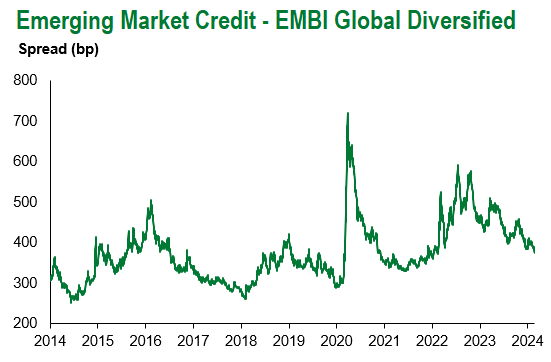
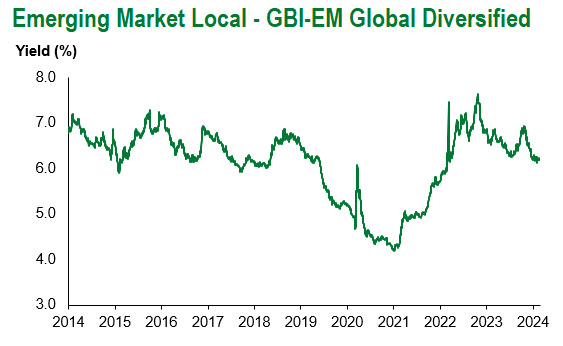
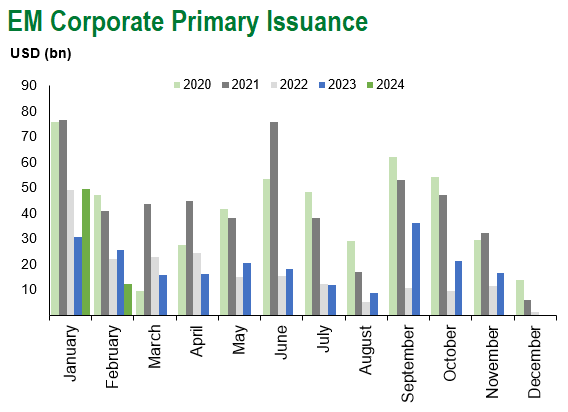
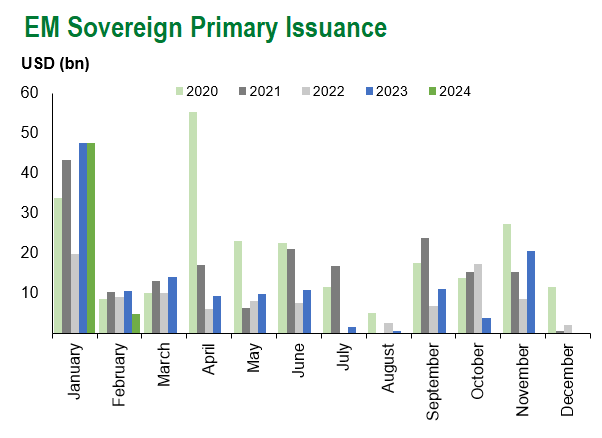
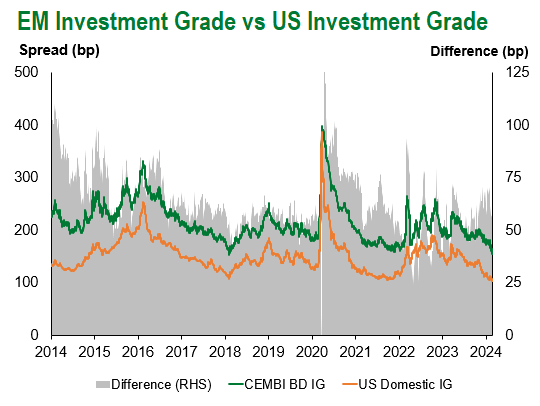
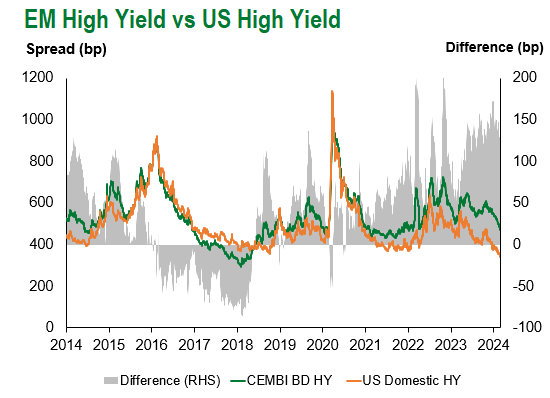
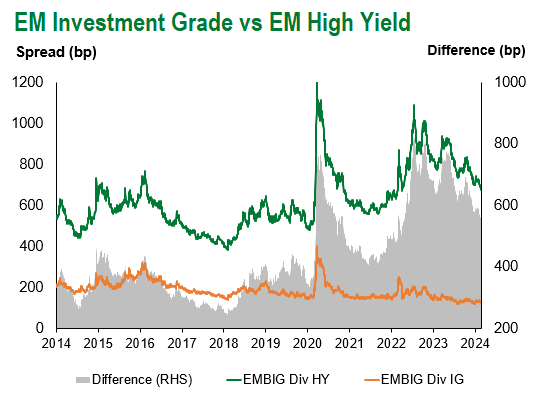
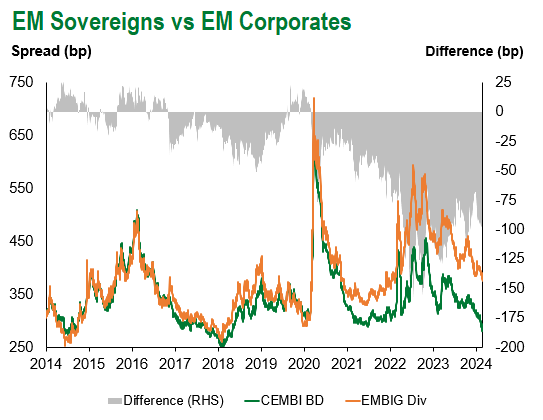
Emerging Markets Flows
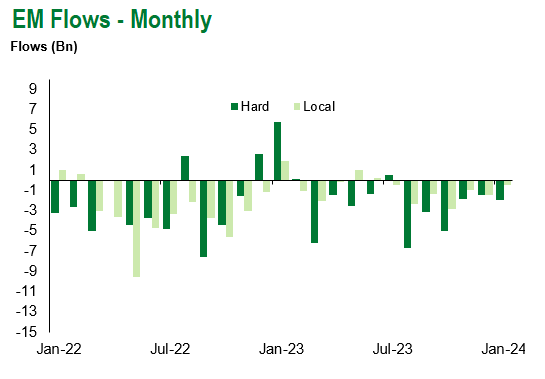
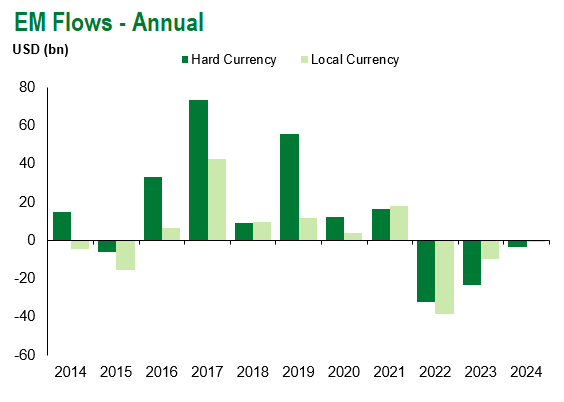
Source for graphs: Bloomberg, JPMorgan, Gramercy. As of February 23, 2024.
For questions, please contact:
Kathryn Exum, CFA ESG, Director, Co-Head of Sovereign Research, [email protected]
Petar Atanasov, Director, Co-Head of Sovereign Research, [email protected]
James Barry, Director, Deputy Portfolio Manager, [email protected]
This document is for informational purposes only. The information presented is not intended to be relied upon as a forecast, research or investment advice, and is not a recommendation, offer or solicitation to buy or sell any securities or to adopt any investment strategy. Gramercy may have current investment positions in the securities or sovereigns mentioned above. The information and opinions contained in this paper are as of the date of initial publication, derived from proprietary and nonproprietary sources deemed by Gramercy to be reliable, are not necessarily all-inclusive and are not guaranteed as to accuracy. This paper may contain “forward-looking” information that is not purely historical in nature. Such information may include, among other things, projections and forecasts. There is no guarantee that any forecasts made will come to pass. Reliance upon information in this paper is at the sole discretion of the reader. You should not rely on this presentation as the basis upon which to make an investment decision. Investment involves risk. There can be no assurance that investment objectives will be achieved. Investors must be prepared to bear the risk of a total loss of their investment. These risks are often heightened for investments in emerging/developing markets or smaller capital markets. International investing involves risks, including risks related to foreign currency, limited liquidity, less government regulation, and the possibility of substantial volatility due to adverse political, economic or other developments. References to any indices are for informational and general comparative purposes only. The performance data of various indices mentioned in this update are updated and released on a periodic basis before finalization. The performance data of various indices presented herein was current as of the date of the presentation. Please refer to data returns of the separate indices if you desire additional or updated information. Indices are unmanaged, and their performance results do not reflect the impact of fees, expenses, or taxes that may be incurred through an investment with Gramercy. Returns for indices assume dividend reinvestment. An investment cannot be made directly in an index. Accordingly, comparing results shown to those of such indices may be of limited use. The information provided herein is neither tax nor legal advice. Investors should speak to their tax professional for specific information regarding their tax situation.
